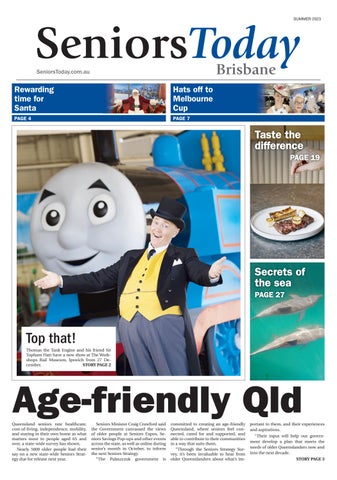Retired Queensland accountant and cervical cancer survivor Barb Tasker believes mixed information could lead to older women not continuing to have themselves tested for cervical cancer.
The 65-year-old who works at the Australian Cervical Cancer Foundation is urging older women, especially those over 65 to continue to screen for cervical cancer.
She is also a champion of the new non-invasive self-collection method of screening.
Her call comes at time there has been a clarion call for many Australian women, in the form of a new study in the Cancer Epidemiology, Biomarkers & Prevention Journal for the American Association for Cancer Research, has found that more women over 65 years (71 per cent) presented with late-stage cervical cancer than younger women. (48 per cent).
For Barb her diagnosis was a wake-up call.
“My husband was in the services so we travelled around a little bit, which was absolutely lovely, but also I had to go and source new GPs, new doctors that sort of thing every time we moved around,” she said.
“I was working in the health sector myself and I went and had a pap smears- what they called it back then. I was probably in my early 40s, I had two young teenagers, I’d had a pap smear, not a very comfortable experience as any of them are. You talk to women and we wonder why people didn’t have them and that’s why going back then.
“I didn’t think any more of it. Cervical cancer didn’t mean much, it was like yeah I just need to go and have another test, like going to the dentist. It was routine but then I got a phone call from a doctor advising of some abnormal cells. I thought again – what does this mean.
“He referred me onto an gynecologist who did a further a cone biopsy, abnormal cells weren’t uncommon back then but I don’t think we women realised what it could go on to be if we didn’t do something.
“I then went back to having regular pap smears.”
However when she turned 65 a GP told her he didn’t think she needed anymore cervical cancer tests.
“Fortunately, I still work a bit for the Cervical Cancer Foundation, so I was right in the core of it and I was hearing different things,” she said.
“I was always interested in hearing more, reading information and I’ve discovered that all that information wasn’t correct and you should have them up to the age of 74.
“This is the thing, I don’t think, women realise this. From my point of view I’d like to stress to women over the age of 65- don’t stop screening. In Australia experts are recommending screening for HVP until 74 so I will continue with that.
“I talk to a lot of my friends and tell them to get it done. I don’t think we realise what it will lead onto.”
Barb said one of the barriers is the smear test itself the invasiveness.
“Now there is a new self collection message you can do on your own, it’s a message we have to get out to people,” she said.
According to the new study evidence shows us that with adequate screening and follow-up, cervical cancer can be prevented or detected at early-stage (stage I), which is related to excellent survival. Current guidelines recommend discontinuing screening for women over 65 years with history of normal Pap and/or HPV tests, potentially leaving this age group vulnerable.
The study revealed late-stage five-year relative survival was lower over 65 years (23 – 37 per cent) compared to younger patients (42 – 52 per cent) – so there remains a significant burden of advanced cervical cancer in this age group.
In Australia in 2022 there were 942 women diagnosed with cervical cancer. (Cancer Australia data).








